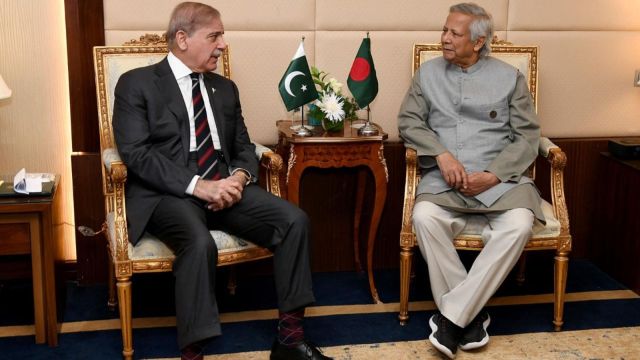

New DelhiFeb 25, 2025 13:51 IST First published on: Feb 25, 2025 at 13:50 IST
A month ago, four top officials of Pakistan’s Inter-Services Intelligence (ISI) Directorate visited Dhaka for talks with their Bangladeshi counterparts. This followed a visit of a six-member Bangladeshi military delegation to Pakistan. This was the first visit by the ISI to Bangladesh since 2009, and before that, the last public visit was in 1989, when ISI chief Hamid Gul was received by the Bangladeshi military dictator H M Ershad.
Even as ties between India and Bangladesh fray, those between Dhaka and Islamabad seem to be growing apace. In September, and then again in December, Pakistani Prime Minister Shehbaz Sharif met with Bangladesh’s Chief Advisor to the Interim Government, Mohammad Yunus. The two leaders discussed strengthening historical and cultural ties and increasing trade between the two countries. Earlier this month, a Bangladeshi warship participated in a multinational naval exercise hosted by Pakistan in the seas off Karachi.
Story continues below this ad
Let’s be clear: Relations between Pakistan and Bangladesh have not been hostile in the past decades despite the bloody past of the liberation movement. Islamabad had quickly repaired its ties with Dhaka after the end of the war. During the tenure of the Bangladesh Nationalist Party (BNP) government from 1991-1996 and 2001-2006, there was considerable diplomatic exchange with Pakistan and some undercover activity aimed at India.
For this reason, India cannot look at the new developments with equanimity. The ISI has played a significant role in promoting separatism and terrorism in the country from the very beginning. According to Hans Kiessling, a historian of the organisation, Pakistan began supporting the Naga insurgency in the mid 1950s through bases in what was then East Pakistan. In the 1990s and till the mid-2000s, extensive ISI assistance was extended from its embassy in Dhaka to the ULFA (United Liberation Front of Asom), Mizo, Manipuri and Tripura separatists.
As terrorist bombings hit Indian cities like Jaipur, Surat, Ahmedabad, Guwahati, New Delhi and Mumbai in the 1990s and early 2000s, ISI stations used the porous Indo-Bangladeshi border to run agents into India. One such person was the current Jaish-e-Muhammad chief Masood Azhar who was arrested in 1993 and had to be released because of the IC-814 hijack in December 1999. It was only in the mid-2000s that India began to fence its border with Bangladesh. But this has hardly prevented infiltration, given the riverine terrain. What helped was the arrival of the Sheikh Hasina regime that cracked down on terrorism in Bangladesh.
Story continues below this ad
The growing Pakistan-Bangladesh entente raises important strategic concerns for India. It is not just the issue of the northeast and Pakistan’s historical use of Bangladesh as a base for anti-India activity. High-level military exchanges could be a prelude to enhanced defence cooperation which could include joint naval exercises in the Bay of Bengal. Even more worrisome is the possibility of the supply of the Abdali conventional ballistic missiles by Pakistan to Bangladesh. There is a perfect match between Bangladesh and Pakistan’s goals: Dhaka wants to reduce its dependence on Delhi, while Islamabad wants to counterbalance Delhi in the geopolitics of the region.
There are economic concerns as well. Bangladesh has a substantial trade relationship with India and a bilateral trade of around $15 billion, which is much higher than what it has with Pakistan. Diversification, however, could reduce economic dependence on India. Deteriorating relations could have a retrograde influence on New Delhi’s regional policy as well. Currently, Bangladesh is the lynch-pin of the BIMSTEC (Bay of Bengal Initiative for Multi-Sectoral Technical and Economic Cooperation), a regional organisation that India has encouraged in place of SAARC (South Asian Association for Regional Cooperation) to curtail Pakistani influence.
And then there is China, which already has significant influence in Bangladesh and is its largest trading partner. It has funded important infrastructure projects there and has been a major supplier of weapons to Bangladesh’s military. China has historically used Pakistan as a strategic partner to counter Indian influence in South Asia, and Beijing is unlikely to miss any opportunity of deepening its influence with the help of both Dhaka and Islamabad.
most read
Given where Bangladesh is located, India does not have the option of throwing in the towel. The situation there is politically fluid. No one is sure who is really in control. For now, the Awami League has been knocked out, but the BNP has signalled that it is willing to do business with Delhi. However, there are other players who are implacably opposed to India such as the Jamaat-e-Islami, which opposed Bangladesh’s freedom movement in 1971, but have now retrieved their reputation because of the anti-Hasina uprising six months ago.
Delhi should enhance its border security, even while continuing to engage with Dhaka on counter-terrorism and joint military cooperation. The Interim Government needs to address anti-India sentiments, especially in relation to the Hindu minority, pro-actively and without rancour. Meanwhile, India should continue to engage with the Interim Government without animosity and recrimination. It should also rope in the United States, the United Kingdom and the European Union, which are the major export destinations for Bangladesh, in its diplomatic efforts.
The writer is a Distinguished Fellow, Observer Research Foundation, New Delhi


